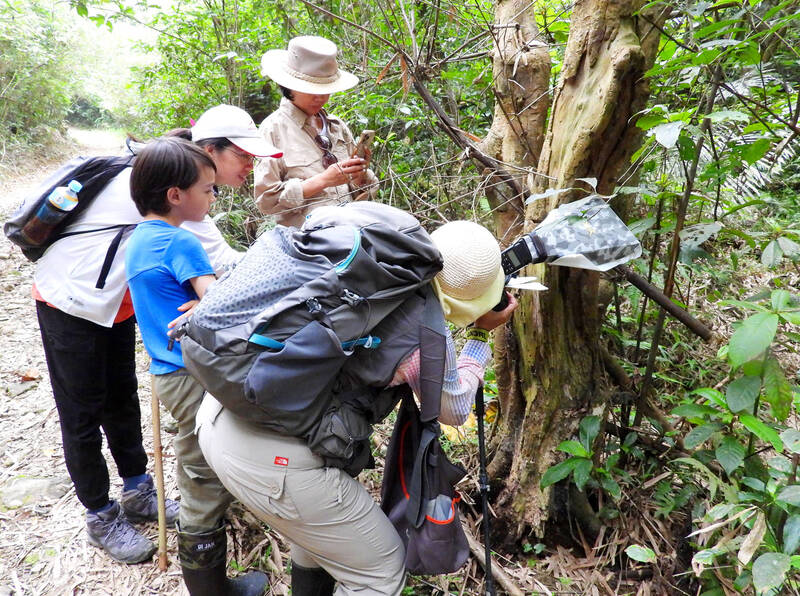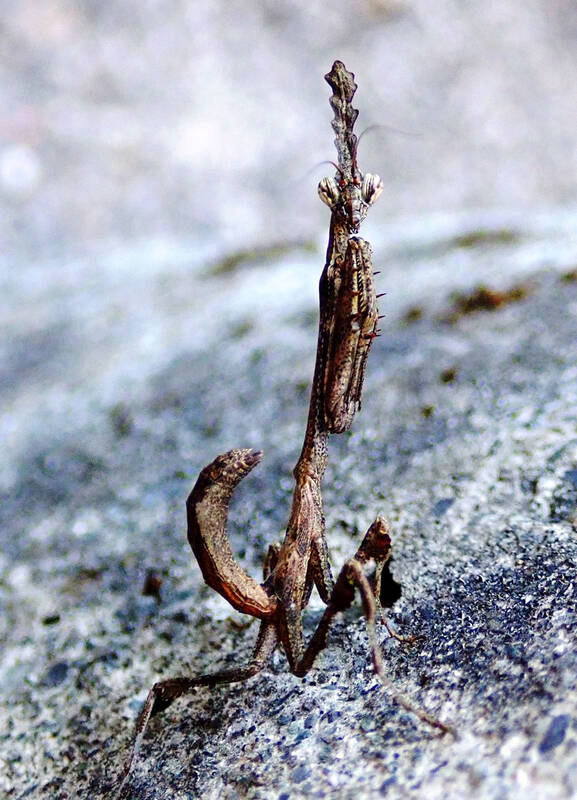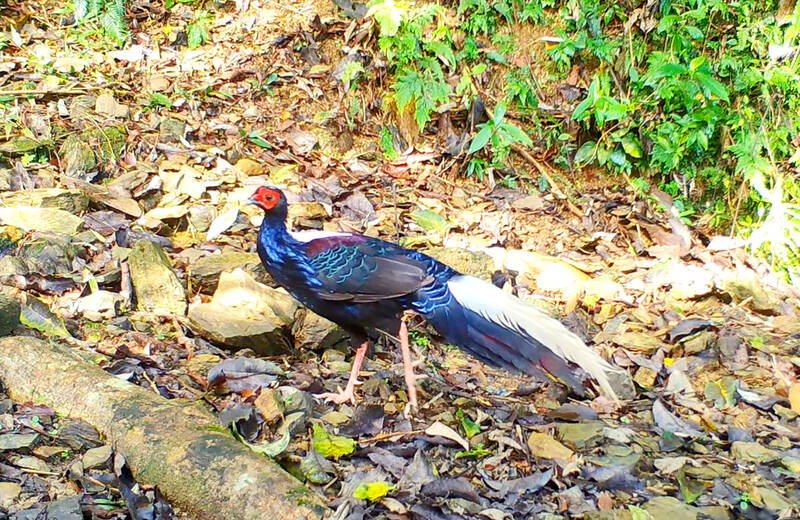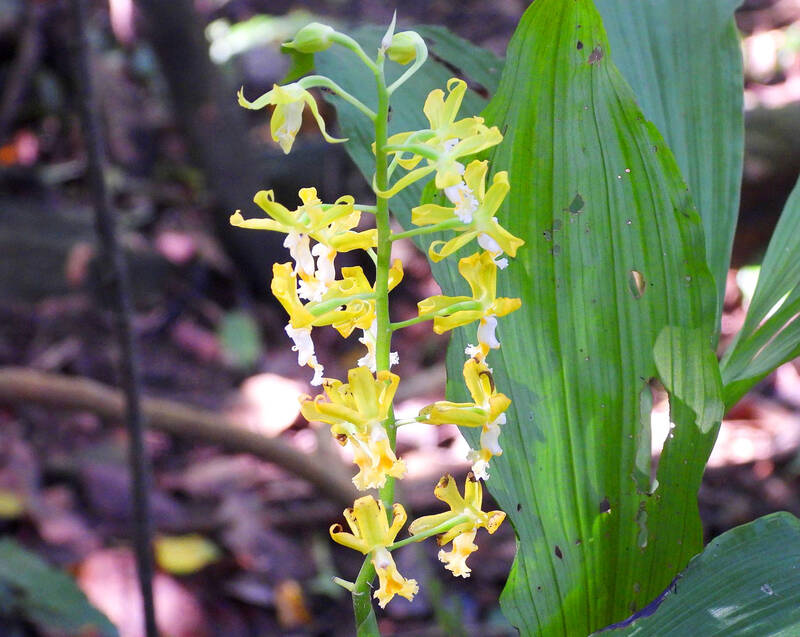When the Society of Wilderness (SOW, 荒野保護協會) was established by a group of environmental activists in 1995, acquiring land where the NGO could implement its ideas of eco-friendly stewardship was among its long-term goals. But it wasn’t until 2018 that SOW was able to take ownership of their first plot, a 1761m2 tract of woodland and abandoned tea plantation in Yilan County’s Dongshan Township (冬山).
As Hsieh Hsiang-yen (謝祥彥), director of SOW’s Habitat Department, explains, the organization was first alerted to the plot’s existence by a SOW supporter who works at the Ministry of Finance’s National Property Administration (NPA) and who’d been keeping an eye open for potential sites.
“He referred us to a plot that had no owner, so we made some checks and conducted an ecological investigation of the site, to see if it was suitable,” Hsieh recalls.

Photo courtesy of Society of Wilderness
Among the NPA’s responsibilities is the management of properties that end up ownerless. This can happen if a deceased landowner’s next-of-kin renounce their rights, or if they fail to complete the inheritance registration process. The NPA arranged a public auction, at which SOW was the only bidder, and the NGO paid NT$960,066 to obtain ownership of the land.
For much of its existence, SOW lacked the funds to buy land. This changed in 2016, when one supporter donated NT$800,000 on condition it be used to acquire a slice of nature. Soon afterward, another backer gave NT$100,000 for the same purpose.
ESCAPING DEVELOPMENT

Photo courtesy of Society of Wilderness
Hsieh expresses confidence that what SOW now calls Wilderness No. 1 (荒野一號地) can escape the development that has impacted so much of Taiwan. Nobody lives nearby, and while those who farm nearby occasionally enter the property to check on their water pipes, for several years there’s been minimal human interference, he says.
Describing the state of the land as “very natural,” Hsieh says that access isn’t especially difficult, thanks to a narrow road built by state-run utility Taipower (台電) so it can maintain high-voltage power lines. Wilderness No. 1 can thus be used for ecological education activities designed to build awareness and attract new volunteers. However, because it’s relatively remote, finding people willing to conduct regular patrols and maintain the infrared camera traps that have been installed on the site is a challenge, he says.
SOW has been surveying Wilderness No. 1’s animal population, which includes pangolins and civets, and compiling data on the iNaturalist online platform. So far, no critically endangered species have been spotted — but experts were surprised to notice yellow-throated martens, mammals usually seen at higher elevations.

Photo courtesy of Society of Wilderness
“We’re building up a database of species, which we can use if we need to lobby against plans to develop the area,” Hsieh says.
The history of Wilderness No. 2 (荒野二號地) is quite different to that of Wilderness No. 1. Covering approximately 35,000m2, it’s also much bigger.
For more than 30 years, this patch of steeply sloping land in New Taipei City’s Sijhih District (汐止) was half-owned by Nan Ya Plastics Corp. (南亞塑膠), a listed company affiliated with the Formosa Plastics Group. In 2022, Nan Ya Plastics not only assigned its share to SOW, but also provided NT$350,000 to cover taxes and fees associated with the transfer.

Photo courtesy of Society of Wilderness
Even though SOW now shares ownership of Wilderness No. 2 with other entities, Hsieh doesn’t think that the group’s conservation goals will cause conflict. Nan Ya Plastics has coordinated and maintained good relations with the other stakeholders. What’s more, because the property is so difficult to reach, it’s very unlikely anyone will try to farm or build on it, he says.
Like Wilderness No. 1, Wilderness No. 2 is categorized by the government as forestry land. (In an emailed response, Nan Ya Plastics didn’t explain why they bought the land back in the 1980s.) SOW volunteers have identified orchid species there which, in other places, are often stolen. This is proof, Hsieh says, of how few humans set foot on this hillside.
Despite there being highly successful examples in other countries — perhaps the best known being the UK’s National Trust — Hsieh concedes that convincing Taiwanese to donate land to a nonprofit is extremely difficult. The NGO needs to show not just the best of intentions, but also the ability to look after the sites it acquires. It’s no surprise that he calls both Wilderness No. 1 and Wilderness No. 2 “huge landmarks for us.”
BUILDING ON EXPERIENCE
SOW has gained considerable experience when it comes to land regulations and management, as well as a better understanding of its volunteers’ abilities, he says. More and more people are helping the group in its search for other potential sites. An SOW supporter who works as a realtor brought one piece of land to the leaders’ attention, and this summer it became Wilderness No. 3 (荒野三號地).
Zoned as forest, the 29,961m2 property in Miaoli County’s Shihtan Township (獅潭) cost the NGO NT$5.91 million, including taxes and fees. Hsieh says there’s a high probability that leopard cats will show up in the vicinity.
What SOW hopes will become its fourth property is in Hsinchu County’s Hengshan Township (橫山). Part of the site is an orange orchard zoned for agriculture, while the remainder is forestry land.
When sufficient funds have been raised, taking ownership of the latter should be straightforward. However, because regulations restrict the ownership of farmland by nonprofits, the former is being purchased by SOW supporters who’ll entrust control of it to the group. A tenant farmer in Yilan County recently used a somewhat similar arrangement to protect the land she tills from development (see “Protecting Taiwan’s green spaces one ping at a time” in the April 10, 2024 Taipei Times).
According to Hsieh, right now a few volunteers are actively searching for more land which SOW can “protect and allow nature to manage itself and restore its vitality.”
While it’s true that the further a particular place is from a major human settlement, the more likely it is to be undeveloped and unpolluted, Hsieh says that SOW hopes to acquire plots of land which aren’t so remote.
Outlining what he calls a “thumbtack strategy,” he says that if the NGO can buy several small plots near major cities, they might be able to throw a wrench in the works when the authorities or large enterprises propose undesirable development projects. Hsieh cites as an inspiration the work of Japan’s Totoro Fund, which since 1991 has bought 57 pieces of land, noting that, by purchasing properties here and there, SOW may prevent unwanted development and help preserve ecological corridors.
“It’s taken time to build up our credibility. Now that we have it, we can only hope our work will become a lot easier in the future. We hope our volunteers can suggest possible ‘thumbtacks’ for us to buy. It’s all down to chance,” says Hsieh.
Steven Crook, the author or co-author of four books about Taiwan, has been following environmental issues since he arrived in the country in 1991. He drives a hybrid and carries his own chopsticks. The views expressed here are his own.

Under pressure, President William Lai (賴清德) has enacted his first cabinet reshuffle. Whether it will be enough to staunch the bleeding remains to be seen. Cabinet members in the Executive Yuan almost always end up as sacrificial lambs, especially those appointed early in a president’s term. When presidents are under pressure, the cabinet is reshuffled. This is not unique to any party or president; this is the custom. This is the case in many democracies, especially parliamentary ones. In Taiwan, constitutionally the president presides over the heads of the five branches of government, each of which is confusingly translated as “president”

By 1971, heroin and opium use among US troops fighting in Vietnam had reached epidemic proportions, with 42 percent of American servicemen saying they’d tried opioids at least once and around 20 percent claiming some level of addiction, according to the US Department of Defense. Though heroin use by US troops has been little discussed in the context of Taiwan, these and other drugs — produced in part by rogue Chinese Nationalist Party (KMT) armies then in Thailand and Myanmar — also spread to US military bases on the island, where soldiers were often stoned or high. American military policeman

An attempt to promote friendship between Japan and countries in Africa has transformed into a xenophobic row about migration after inaccurate media reports suggested the scheme would lead to a “flood of immigrants.” The controversy erupted after the Japan International Cooperation Agency, or JICA, said this month it had designated four Japanese cities as “Africa hometowns” for partner countries in Africa: Mozambique, Nigeria, Ghana and Tanzania. The program, announced at the end of an international conference on African development in Yokohama, will involve personnel exchanges and events to foster closer ties between the four regional Japanese cities — Imabari, Kisarazu, Sanjo and

The Venice Film Festival kicked off with the world premiere of Paolo Sorrentino’s La Grazia Wednesday night on the Lido. The opening ceremony of the festival also saw Francis Ford Coppola presenting filmmaker Werner Herzog with a lifetime achievement prize. The 82nd edition of the glamorous international film festival is playing host to many Hollywood stars, including George Clooney, Julia Roberts and Dwayne Johnson, and famed auteurs, from Guillermo del Toro to Kathryn Bigelow, who all have films debuting over the next 10 days. The conflict in Gaza has also already been an everpresent topic both outside the festival’s walls, where